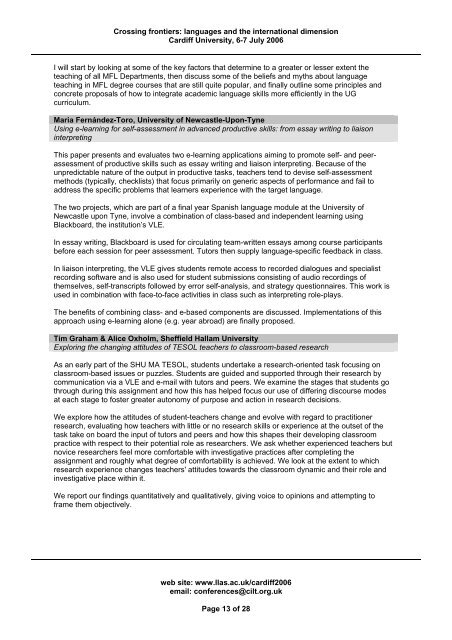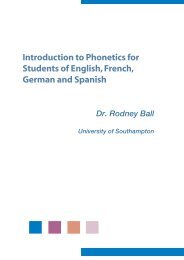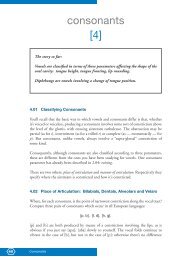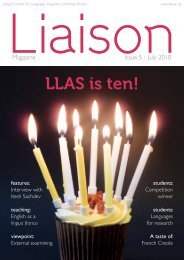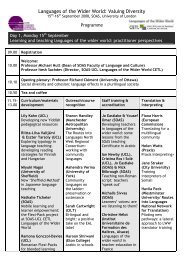Crossing frontiers: Languages and the international dimension
Crossing frontiers: Languages and the international dimension
Crossing frontiers: Languages and the international dimension
Create successful ePaper yourself
Turn your PDF publications into a flip-book with our unique Google optimized e-Paper software.
<strong>Crossing</strong> <strong>frontiers</strong>: languages <strong>and</strong> <strong>the</strong> <strong>international</strong> <strong>dimension</strong><br />
Cardiff University, 6-7 July 2006<br />
I will start by looking at some of <strong>the</strong> key factors that determine to a greater or lesser extent <strong>the</strong><br />
teaching of all MFL Departments, <strong>the</strong>n discuss some of <strong>the</strong> beliefs <strong>and</strong> myths about language<br />
teaching in MFL degree courses that are still quite popular, <strong>and</strong> finally outline some principles <strong>and</strong><br />
concrete proposals of how to integrate academic language skills more efficiently in <strong>the</strong> UG<br />
curriculum.<br />
Maria Fernández-Toro, University of Newcastle-Upon-Tyne<br />
Using e-learning for self-assessment in advanced productive skills: from essay writing to liaison<br />
interpreting<br />
This paper presents <strong>and</strong> evaluates two e-learning applications aiming to promote self- <strong>and</strong> peer-<br />
assessment of productive skills such as essay writing <strong>and</strong> liaison interpreting. Because of <strong>the</strong><br />
unpredictable nature of <strong>the</strong> output in productive tasks, teachers tend to devise self-assessment<br />
methods (typically, checklists) that focus primarily on generic aspects of performance <strong>and</strong> fail to<br />
address <strong>the</strong> specific problems that learners experience with <strong>the</strong> target language.<br />
The two projects, which are part of a final year Spanish language module at <strong>the</strong> University of<br />
Newcastle upon Tyne, involve a combination of class-based <strong>and</strong> independent learning using<br />
Blackboard, <strong>the</strong> institution’s VLE.<br />
In essay writing, Blackboard is used for circulating team-written essays among course participants<br />
before each session for peer assessment. Tutors <strong>the</strong>n supply language-specific feedback in class.<br />
In liaison interpreting, <strong>the</strong> VLE gives students remote access to recorded dialogues <strong>and</strong> specialist<br />
recording software <strong>and</strong> is also used for student submissions consisting of audio recordings of<br />
<strong>the</strong>mselves, self-transcripts followed by error self-analysis, <strong>and</strong> strategy questionnaires. This work is<br />
used in combination with face-to-face activities in class such as interpreting role-plays.<br />
The benefits of combining class- <strong>and</strong> e-based components are discussed. Implementations of this<br />
approach using e-learning alone (e.g. year abroad) are finally proposed.<br />
Tim Graham & Alice Oxholm, Sheffield Hallam University<br />
Exploring <strong>the</strong> changing attitudes of TESOL teachers to classroom-based research<br />
As an early part of <strong>the</strong> SHU MA TESOL, students undertake a research-oriented task focusing on<br />
classroom-based issues or puzzles. Students are guided <strong>and</strong> supported through <strong>the</strong>ir research by<br />
communication via a VLE <strong>and</strong> e-mail with tutors <strong>and</strong> peers. We examine <strong>the</strong> stages that students go<br />
through during this assignment <strong>and</strong> how this has helped focus our use of differing discourse modes<br />
at each stage to foster greater autonomy of purpose <strong>and</strong> action in research decisions.<br />
We explore how <strong>the</strong> attitudes of student-teachers change <strong>and</strong> evolve with regard to practitioner<br />
research, evaluating how teachers with little or no research skills or experience at <strong>the</strong> outset of <strong>the</strong><br />
task take on board <strong>the</strong> input of tutors <strong>and</strong> peers <strong>and</strong> how this shapes <strong>the</strong>ir developing classroom<br />
practice with respect to <strong>the</strong>ir potential role as researchers. We ask whe<strong>the</strong>r experienced teachers but<br />
novice researchers feel more comfortable with investigative practices after completing <strong>the</strong><br />
assignment <strong>and</strong> roughly what degree of comfortability is achieved. We look at <strong>the</strong> extent to which<br />
research experience changes teachers' attitudes towards <strong>the</strong> classroom dynamic <strong>and</strong> <strong>the</strong>ir role <strong>and</strong><br />
investigative place within it.<br />
We report our findings quantitatively <strong>and</strong> qualitatively, giving voice to opinions <strong>and</strong> attempting to<br />
frame <strong>the</strong>m objectively.<br />
web site: www.llas.ac.uk/cardiff2006<br />
email: conferences@cilt.org.uk<br />
Page 13 of 28


